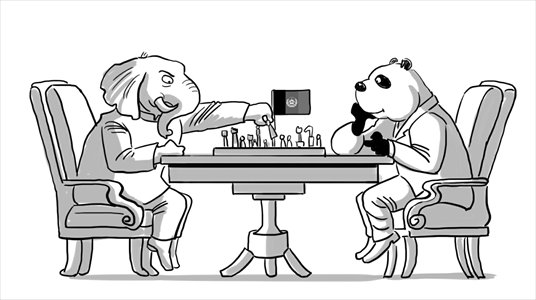Afghan concerns push China, India closer

Coming events cast a long shadow, and nowhere more than in international diplomacy. The new Chinese leadership has put India high on the radar, as is evident from the fact that the two sides are already talking about the visits and exchanges at the highest political levels.
There is one area where the two Asian powers are already consulting with each other, and that too for the first time: a bilateral dialogue on Afghanistan to seek a convergence of positions, thoughts and policies for a possible collaboration in Afghanistan.
India and China held their first dialogue on Afghanistan in Beijing on April 18. Their goal was to thrash out a strategy to deal with a possible and much-feared return of the Taliban and Al Qaeda in Afghanistan after US and NATO troops begin their proposed phased exit from the war-ravaged land-locked nation in February 2014.
Luo Zhaohui, director-general of the Asian division of the Chinese Ministry of Foreign Affairs and Yash Sinha, additional secretary for Pakistan, Afghanistan and Iran in the Ministry of External Affairs, led the delegations.
Chinese Ministry of Foreign Affairs spokesperson Hua Chunying, while briefing the media after the meeting, stated "the two sides agreed that the Afghan issue concerns regional security and stability. China and India are two important countries in the region and consultations on Afghanistan help them to coordinate positions, deepen cooperation and contribute to early settlement of the issue."
The development has huge political import. It signifies China's increasing concern over post-2014 Afghanistan. More importantly, it amplifies a new change in China's Afghanistan strategy. The most important change is that China is becoming more open to other stakeholders besides its traditional allies in its Afghanistan security policy.
China has seen how India badly miscalculated and paid the price by nurturing only the likes of anti-Taliban Pashtun leader Ahmad Shah Massoud. After Massoud's assassination just before the September 11 attack, India found itself running like a headless chicken in the volatile strategic space of Afghanistan.
China, chastened in proxy by the Indian experience in the ever-changing Afghan strategic kaleidoscope, appears to have embarked on a bold diplomatic initiative.
The fact that China held its first-ever bilateral dialogue with India on Afghanistan demonstrates the fast-changing mind-set of the movers and shakers in the Chinese strategic establishment.
The message is clear. China is no longer shutting itself out as far as the Afghan theater is concerned. China is keeping its ears and options open to hear out what other stakeholders have to say besides the Pakistanis.
But hold on. It doesn't mean that the Chinese tiger is changing its stripes overnight. China is not ready to shun its age-old ally Pakistan and embrace India, even on Afghanistan-related issues where China has huge political, economic and strategic interests.
Nor do the Indians have stars in their eyes. They also do not think that it was a strategic game changer when the Chinese approached the Indians with a suggestion of a bilateral dialogue on Afghanistan.
The Chinese are simply checking out the Afghanistan big picture and are in the process of having as many diverse views on the subject as possible. The Chinese strategy is twofold: know the views of every important stakeholder and then move as per your national interest, and trust, but verify.
New Delhi will do well to understand that the Chinese move does not at all signify a change in Beijing's approach vis-à-vis Afghanistan or Pakistan. China is unlikely to dump Pakistan over Afghanistan, even though it is overly concerned about the possibility of a Taliban or pro-Taliban-ruled Afghanistan after the US troops' pullout affecting the security situation in its Muslim-dominated Xinjiang autonomous region.
The Chinese are actually checking out the Indians. They are trying to elicit the "other" views of how to deal with the post-2014 Afghanistan after having a focused trilateral dialogue on Afghanistan with Russia and Pakistan. After all, China has invested over $3 billion in Afghanistan, and expects some return.
The author is a New Delhi-based journalist-author and a strategic affairs analyst. bhootnath004@yahoo.com